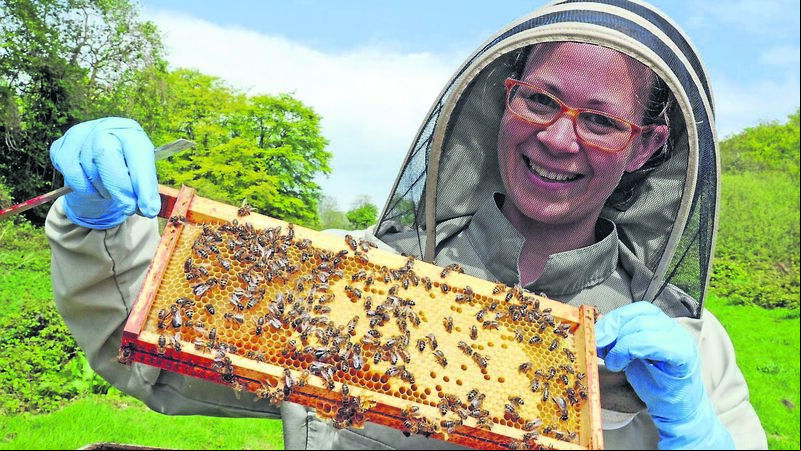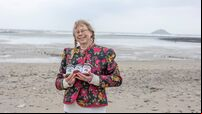Dressmaker is now Cork’s queen bee

Hanna Backmo, beekeeper, holding a frame from a hive at the apiary.
FROM a couple of hives in her vegetable garden to help pollinate her fruit trees, to five apiaries dotted around Cork county just seven years later... Hanna Bäckmo its with a laugh that once the beekeeping bug bit, her interest in bees “became an obsession and took over”.
So much so that, within the past year, Hanna made the decision to switch completely from her dressmaking business to keeping bees, selling honey and other products including “bee wraps,” a reusable alternative to cling-film popular with Zero-Wasters, and keeping her hives humming happily.
The height of summer is a busy time for her bees.
“We’re in the middle of the honey flow, so now is when the bees are making all the honey for us,” Hanna explains.
“All the work that was put in in the winter and the spring is coming to fruition now.
“They’re working on the blackberry flowers; that’s the main flower that’s around at the moment.”
While the Covid-19 lockdown may have grounded humans, Hanna says it was a positive time for honey bees, both because of the long stretch of fine weather we had and because grass verges all over Cork county remained uncut.
“I think because they weren’t cutting the roadside verges, there were a lot more wildflowers and things like dandelions,” Hanna says. “The bees had more forage in places they wouldn’t normally have so they seem happy now.”
With more people taking long strolls and enjoying their natural surroundings, Hanna says lockdown also seemed to spark a growing awareness of bees and other pollinators amongst the public.
“People were out walking a lot more so they were able to see it; I think people’s awareness about bees and bumblebees is a bit higher because of lockdown,” she says.
“There’s a lot of people who wouldn’t normally have the time that are suddenly seeing all these things and appreciating it.”
Bees are the most essential workers of all: without their pollinating activities, the bulk of human food crops would fail.
The survival of the human race is intricately linked with the fate of the busy little insects, and yet many of Ireland’s wild bee species are endangered.
“When it comes to honey bees, nearly all the honey bees in the country are managed, so they live in hives,” Hanna explains.
“But there are loads of wild species and solitary bees and bumblebees and they rely on habitat so they can nest.
“I think it’s really important that people are becoming more aware of that.”
A keen gardener who is approaching self-sufficiency in garden produce, Hanna also keeps a flock of happy rescue hens who provide her with eggs. She first decided to get hives to pollinate the fruit trees and berry bushes in the garden of her Little Island home.
“I started with a couple of hives and I did a beginner’s course first; it’s really important to do a course because beekeeping is really intricate.
“It’s not just insects: they’re a super-organism and you have so many responsibilities as a beekeeper and so many things you need to know.
“I did a couple of practicals in the County Cork Beekeepers’ Association where they have a training apiary. Then I got my own hives and put them in the garden and that was it.”
Hanna grew up in Sweden and arrived in Ireland in the early ’00s. Her love of the natural world comes from her childhood on an island off the coast of Gothenburg, close to the Danish border. There, Hanna and her friends had free rein to explore.
“It was a village setting, on an island, so we went off roaming and sailing,” she says. “My dad was a boat-builder so we were brought down to the ship-yard and left roam.
“My parents used to joke I should have been born with webbed feet because I was in the water so much. We grew things and experimented with making things.”
In her teens, Hanna was a student activist and she planned on becoming a diplomat; she studied International Relations at third level.
“Some of us think we’re going to change the world when we grow up, and some of us maybe end up doing that in a different way to what we thought,” she says.
“So I became a beekeeper.”
Dropping her dressmaking in favour of full-time beekeeping last year had been an ambition for a while.
Her business making bee wraps combines elements of dress-making with a way to use her bees’ valuable resource of wax to make something that she knows has a small but positive impact on sustainability.
“Bees make wax as well as honey and beeswax has so many properties: health properties, anti-fungal, anti-bacterial properties,” Hanna says.
“Making something like this instead of just making candles and burning it is a good solution.”
Hanna’s bee wraps are fabric soaked in wax, which can be used to cover bowls and wrap foods, including packed lunches. They cut out the need for single-use plastic wraps in the home, are reusable and can even be re-treated with wax to prolong their lifespan. And they’re even usable as firelighters at the end of their life.
“You can cut up strips and use them as firelighters,” Hanna says. “I make the deluxe version: I go out and collect pine cones and wrap strips around them and they’re like a little fire bomb.
“You light one end and stick it in the fire. I also use them to light my bee smoker, which for me is perfect recycling because they get to start and end their life in the apiary.”
The popularity of Hanna’s bee wraps is, she feels, a testament to how environmental issues are now becoming mainstream concerns for many people.
“I think the mindset has changed and people are more interested in making small changes in their lives,” she says.
“I think people are making more conscious decisions and environmentally friendly decisions.
“Bee wraps are easy because they don’t need a big change in habit or anything like that. It’s a big deal to decide to get rid of a second car: it’s easy to choose bee wraps.”
While Hanna now keeps hives in five different locations in Cork county, she also still has her garden hives: she’s mother to three-year-old Julius, and she says with the bees helps him to “understand and appreciate” the natural world.
“For me, it’s so important to give my child this,” Hanna says. “I’m a single parent, and I’m aware of many things you feel you can’t offer your child.
“Being able to be there and instill this love of nature is really important.
“We sow seeds together, we watch queen bees being born. It’s the biggest gift I can give him.”
Hanna believes that the next generation will be able to reverse decisions that have caused environmental damage if enough respect and love for nature is instilled in them.
“A child will always look for the solutions,” she says.
““Everything you grow up with is normal to you. So if it becomes normal to do the right thing and to consider nature in your decisions, then it’s not difficult.
“You start where it’s easy. But then again, I am a very optimistic person by nature.”







 App?
App?


